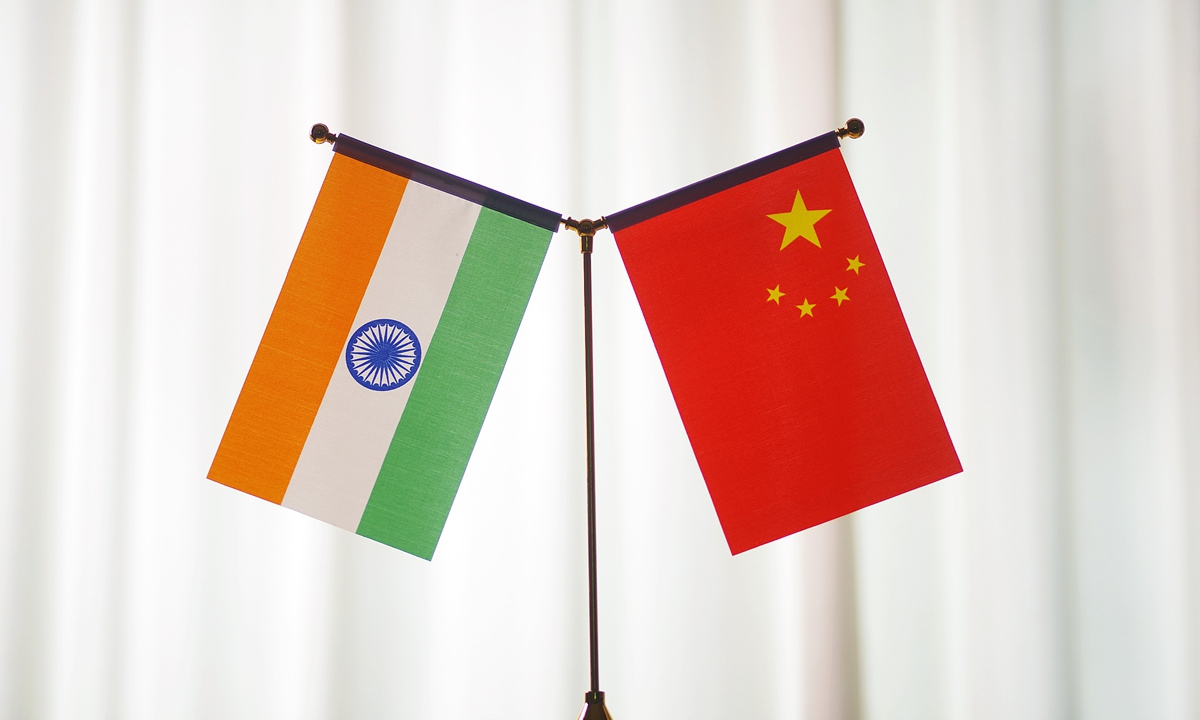
China India Photo:CFP
Chinese border defense troops have returned an Indian national who illegally entered Chinese territory after providing humanitarian aid, the Chinese military revealed on Thursday.
Chinese analysts said this result has refuted rumors by some irresponsible Indian media that hyped that Chinese border soldiers had "kidnapped" the Indian personnel, warning such rumors could poison the atmosphere of continuous improvement of bilateral relations since the "positive and constructive" 14th round of the China-India corps commander level meeting earlier this month.
The Indian national was found by the Chinese border defense troops in a recent patrol in Medog county of Xizang, China, Senior Colonel Long Shaohua, a spokesperson for the Chinese People's Liberation Army Western Theater Command, said in a statement released on Thursday.
According to regulations on border management and control, the Chinese border defense troops carried out a routine inquiry and an epidemic prevention quarantine, and provided humanitarian aid, Long said.
The Indian military sent a request to the Chinese side for assistance in searching for the person through the border defense hotline. The two sides communicated through border defense meeting channels, Long said, noting that the person has already been turned over to the Indian side.
"We urge the Indian side to strictly abide by bilateral protocols and agreements, enhance personnel management and control, and practically safeguard normal order in the border region," Long said.
Earlier, some Indian media and politicians once again played old tricks by spreading rumors that Chinese border soldiers had "kidnapped" a 17-year-old boy in Zangnan, the southern part of Southwest China's Xizang Autonomous Region.
Qian Feng, director of the research department at the National Strategy Institute at Tsinghua University, told the Global Times on Thursday that it is not the first time that some Indian media and politicians have fabricated and hyped similar issues in order to attract attention and cater to anti-China sentiments.
Qian warned that such a nationalistic, hateful and irresponsible narrative by Indian politicians and media could poison the atmosphere for continuous improvement of bilateral relations.
China-India relations have showed signs of easing especially after the 14th round of the China-India corps commander level meeting on January 12 whose outcomes were described as "positive and constructive" by the spokesperson of China's Ministry of National Defense on Thursday.
Senior Colonel Wu Qian, the spokesperson for the ministry, said at a press conference on Thursday that the meeting on January 12 was held in a frank and friendly atmosphere.
After the talks, the two sides issued a joint press release and agreed that both sides should follow the guidance provided by the leaders of the two countries and work for the resolution of the remaining issues at the earliest date.
The two sides also agreed to consolidate the previous outcomes and make effective efforts to maintain security and stability on the ground in the Western Sector, including during the winter.
They also agreed to maintain communication through military and diplomatic channels and reach a mutually acceptable solution through dialogue and consultation as soon as possible.
The China-India border issue is a matter between China and India, and both sides have expressed their opposition to third-party intervention, Wu stressed.
Some people in the US like to use the word "coercion," but little do they know that the US is the initiator and epitome of "coercive diplomacy," Wu pointed out.
China does not engage in "coercion" and is not subject to "coercion," Wu said, noting that China firmly opposes the "coercive diplomacy" of the US against other countries. China will work with India to properly handle the border issue through negotiation and consultation, he said.




